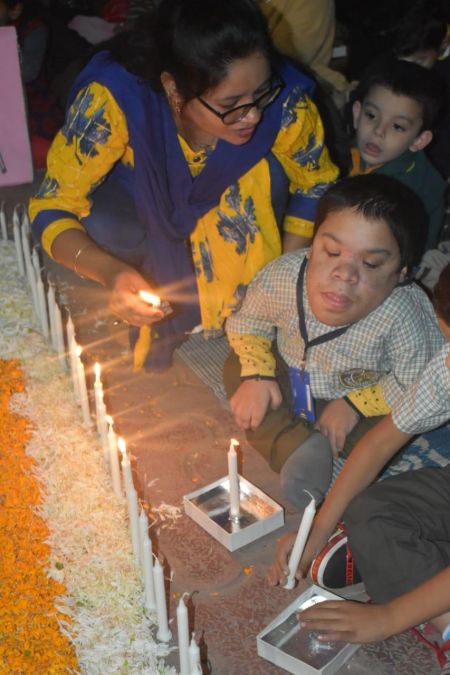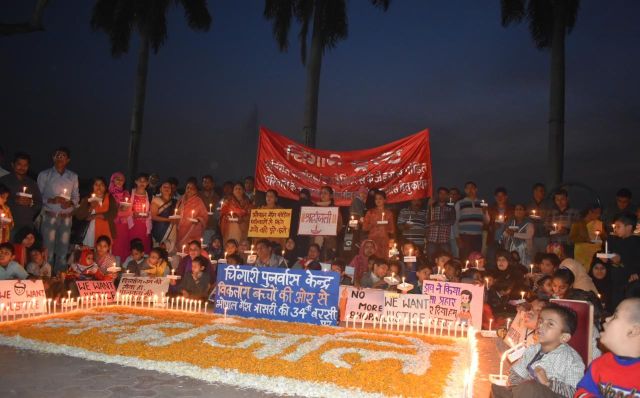
by admin | May 25, 2021 | News

Special children with congenital disabilities of Chingari Rehabilitation Centre holding a peaceful candlelight vigil to pay a tribute to the martyrs of Bhopal’s Union Carbide gas leak at Neelam Park on Saturday evening.
By Pervez Bari, Maeeshat.in,
Bhopal: On the eve of 34th Anniversary of 1984 Bhopal Gas Tragedy a tribute to the martyrs of Bhopal’s Union Carbide gas leak was given by the special children of Chingari Rehabilitation Centre in the form of a peaceful candlelight vigil at Neelam Park here on Saturday evening.
Children with different type of congenital disabilities like cerebral palsy, Down’s syndrome, muscular dystrophy, impaired hearing, etc. participated in this candlelight vigil. The main motto of this peaceful candlelight tribute was to remember the pain and trauma their loved ones had endured.
These children also want the world to learn a lesson from this tragedy and take preventive measures to avoid the recurrence of any such negligent disaster anywhere else in the world. These children are born disabled due to the poisons of Dow Chemical/Union Carbide and not due to nature. We need to learn from this tragedy and create a world where companies cannot spread such poisons. So that, such disabled children are not born.
Meanwhile, Chingari Trust has, for the last 12 years, been taking care of the children born with congenital disorders to families affected by the poisonous gas leak of 1984 and the ground water contamination thereafter. As of today, over nine hundred such children are already registered with Chingari Rehabilitation Centre, with about three hundred children coming each day to get physiotherapy, occupational therapy, speech therapy, special education, supplementary nutrition provisions and transportation facilities – all free of charge.

Special children with congenital disabilities being helped to lit candles on the eve of 1984 Bhopal Gas Tragedy’s 34th anniversary.
It may be recalled here that on the intervening night of December 2-3, 1984 Union Carbide pesticide manufacturing factory had spewed poisonous Methyl Iso-cyanate gas whereby 3000 people had perished virtually instantly and over the years more than 25000 have kissed death and the sad saga is still continuing uninterruptedly. About half a million are suffering from the side effects of the poisonous gas and several thousand people have been maimed for life.

by admin | May 25, 2021 | Employment, Markets, Private Jobs, Technology
 By Nishant Arora,
By Nishant Arora,
Redmond (Washington State) : Artificial Intelligence (AI) is the big buzzword in the world of technology as it promises to change the way we live and interact with devices.
For Microsoft, there is nothing “artificial” about delivering on “intelligence” as the supreme aim is to empower nearly one billion people with disabilities.
The excitement about AI is so evident on the Microsoft campus here that various teams associated with the task have focused their energies towards achieving the impossible — to give differently-abled a normal, dignified life.
The change has been visible in the last couple of years under CEO Satya Nadella who has brought AI to the fore across domains — devices, Cloud, Office 365, Windows and so on.
For him, “Artificial Intelligence represents one of technology’s most important priorities, and heath care is perhaps AI’s most urgent application.”
“AI for Accessibility” is a new, $25 million, five-year programme from Microsoft for developers globally, including in India.
The programme will put AI tools in the hands of developers to accelerate the development of accessible and intelligent AI solutions for people with disabilities.
Jenny Lay-Flurrie, Microsoft’s first-ever Chief Accessibility Officer whose deafness set in at a young age, has a mammoth goal ahead — to utilise AI tools for accessibility and inclusion.
“Accessibility is all about making anything and everything accessible to everyone. We have several programmes for the disabled, like ‘Seeing AI’ and auto alt-text features that are helping narrate the world for people who are blind or have low vision,” Jenny told a group of visiting journalists.
The company has developed apps that describe what people see and feel, help them do text-to-speech and speech-to-text translation and, with predictive text, ensure that people don’t need to type as much.
“We now have eye control, learning tools, ‘Editor’ software, video and audio transcription, and ease of Access settings on Windows 10,” she added.
The “AI for Accessibility” programme provides seed grants of technology to developers, universities, non-governmental organisations and inventors.
At the Accessibility and Inclusion Xbox Lab here, Evelyn Thomas, Senior Programme Manager, is making sure that gamers with limited mobility can enjoy the experience with Xbox Adaptive Controller that has been created to remove barriers by being adaptable to more gamers’ needs.
“Persons with disabilities can now enjoy the immersive experience. You can see here the Xbox family of controllers and devices that are helping such people create a set-up that works for them in a way that is plug-and-play, extensible, and affordable,” Thomas explained.
Microsoft has worked with third-party manufacturers to support external inputs which can be plugged in to the new controller. These inputs include PDP’s One-Handed Joystick for the Xbox Adaptive Controller, Logitech’s Extreme 3D Pro Joystick, and Quadstick’s Game Controller.
Designed for the low-vision community, Microsoft’s app called “Seeing AI” harnesses the power of AI to describe people, text and objects. It can tell visually-impaired persons what is around them. If the phone is pointed at a park, the camera app can describe how the scene looks like.
Similarly, it can tell the amount of your restaurant bill or narrate just about anything it is pointed at.
“AI can help people develop professional skills and influence workplace culture and inclusive hiring,” Jenny said, adding that AI is capable of hearing, seeing, and reasoning with increasing accuracy.
By making software and devices smarter, and keeping them affordable, people gain independence to perform daily tasks and personalise tools for their unique needs.
“AI-driven technology can create possibilities for all people, regardless of how they listen, speak, or write,” Jenny said.
The truth is that only one in 10 people with disabilities globally has access to assistive technologies and products. And, according to Nadella, it is important for us to figure out how to empower more people.
“It has been a personal passion of mine to help people suffering with disabilities like amyotrophic lateral sclerosis (ALS) and autism,” Nadella said recently.
Nadella’s personal passion (his son has cerebral palsy) has now turned into a massive mission at Microsoft, with several teams working towards harnessing the power of AI to empower people with disabilities.
(Nishant Arora was in Redmond on the invitation from Microsoft. He can be contacted at nishant.a@ians.in)
—IANS

by admin | May 25, 2021 | Entrepreneurship, News, Social Entrepreneur, Women Entrepreneur
 By Quaid Najmi,
By Quaid Najmi,
Mumbai : It was barely three months ago that a US-returned medico started a small cafe in upscale Juhu as a unique venture — employing mostly those who suffer from various developmental disabilities. Now, Cafe Arpan has gained huge popularity — among patrons, many of whom have become regulars, and among the 19 specially-abled staffers who love to slog 30 hours over six days a week to make this trendsetter eatery a super success.
“It was like a dream and in planning for nearly a year, but only after getting a proper place and crowdfunding that we finally opened the doors on August 2. I have 19 staffers, mostly full-timers, including my elder daughter, all suffering from some or the other form of developmental disability,” the founder-owner, Dr. Sushama Nagarkar, told IANS.
A psychologist and single mother of two daughters — Aarti (32), who suffers from autism, and Divya (30), settled abroad — Nagarkar wanted “to do something different, and empower people suffering from developmental disabilities”.
Initially, she started with a tiffin service, around one-and-half years ago, which proved to be a hit and had over a dozen staffers with afflictions like autism and Down Syndrome, as also under-developmental and intellectual disabilities, all of which are incurable but impact normal life among all age groups.
Situated opposite the SNDT Women’s University Juhu Campus in Santa Cruz West, Cafe Arpan is specially designed for them.
“With a limited yet distinctive menu, there is ample space for the staffers to move around conveniently and everything functions on electricity for their safety. They can comfortably work around five hours a day and take home salaries comparable with industry standards,” Nagarkar told IANS.
In the age group of 23-50, most are barely literate, but they have learnt to handle everything “with complete dedication and focus”, said Nagarkar, who opened the eatery under the auspices of Yash Charitable Trust (YCT) of which she is Managing Trustee, and which carries out multifaceted social activities.
“I returned to India after 15 years in the US and started the YCT in 2014 to bring people with developmental disabilities into the social and national mainstream, and make them responsible and contributing citizens,” she smiled.
Nagarkar feels these specially-abled people have great potential but severely lack opportunities — and that the Cafe Arpan and the tiffin services have started to contribute in a small way, helping them become independent and capable of supporting themselves and even their families.
Initially, there was a communication gap between the staff and patrons, but the latter proved very understanding and now the going is smooth, with customers appreciating the initiative.
Open for 12 hours from 8 a.m., Cafe Arpna offers a simple but specially-designed menu of barely 30 items like burgers, pizzas, hot/cold beverages and the like, which the specially-abled staffers can themselves handle without complications or calamities.
“During a visit for a snack, I was surprised when one of the staffers took my order, unusually quiet, but apparently efficient, and then served it gracefully. Later, I realised that all the staffers here are specially-abled and the experience was amazing,” said an awed customer, Mini P. Menon.
She feels the venture would help commoners view people with developmental disabilities in a new light and open up new avenues for them to become valued members of the community.
Cafe Arpan’s hand-picked special team includes: Nazneen Kagalwala, Sudha Chhabria, Pratibha Kamath, Ashritha Shetty, Nandini Rajwade, Abuli Mamaji, Aaron Colaco, Samvit Desai, Chetan Jawale, Nikhil Sharma, Shefali Gundecha, Saurabh Kambli, Shonali Menon, Bunny Aman, Ram Bhiwandikar, Raees Shaikh, Anand Jangir, Gaurav Vanvari and Aarti Nagarkar.
She urged people and the society to come together and create more such gainful opportunities that can enable people with developmental disabilities become self-sufficient and lead a dignified life.
On her part, Nagarkar said that all the staffers here have come through word-of-mouth publicity and the demand of the specially-abled job-seekers is increasing.
“I briefly considered a similar venture in the US where I could have got ample state funding. However, I decided on the option here as the need is more in India, though I had to start from scratch. But we are satisfied with the results and may consider expansion plans soon,” Nagarkar concluded.
(The weekly feature series is part of a positive-journalism project of IANS and the Frank Islam Foundation. Quaid Najmi can be contacted at q.najmi@ians.in )
—IANS





